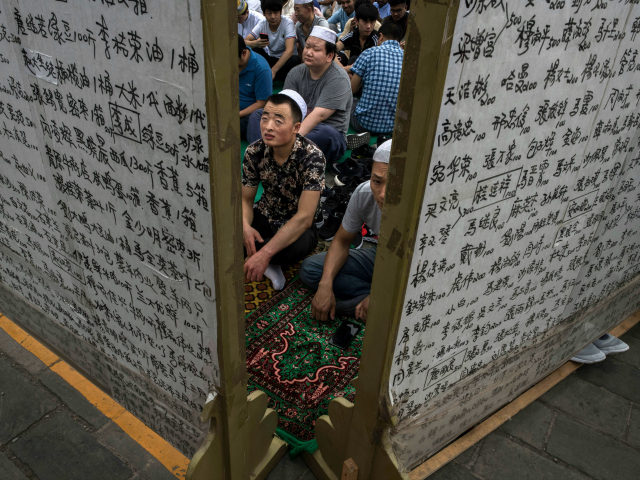Chinese officials announced the shutdown of three mosques on Saturday for conducting “illegal religious education.”
The mosques were located not in the restless Xinjiang province where the Uighur Muslims dwell, but in southwestern China, where the Hui Muslims have enjoyed a more harmonious relationship with authorities until recently.
The South China Morning Post noted on Monday that Hui Muslims have been increasingly subjected to crackdowns and harassment despite years of being held up as the model Chinese Muslim community:
Police action in the villages of Huihuideng, Sanjia and Mamichang was coordinated by the Weishan County Ethnic and Religious Affairs Committee to “protect harmony and stability in the religious domain”, the official notice said.
They said government workers had tried to educate the worshippers on Chinese law concerning religious affairs several times.
A source in Yunnan told BuzzFeed News that registration applications from mosques had been denied by local authorities several times in the past decade.
The mosque shutdowns were not polite affairs. The SCMP said Chinese officials have not yet announced whether any of the worshipers were jailed, but it seems likely based on leaked video of the raids:
Video footage of Saturday’s police raids appeared on Twitter. A clip shared by the NGO Documenting Oppression Against Muslims shows dozens of uniformed police officers confronting Hui Muslim worshippers, dragging them from a mosque entrance. Police officers were shown shoving and, in some cases, attacking protesters.
“Five or six police officers held me down on the floor and I was beaten until I lost consciousness,” one female worshipper’s WeChat message shared on Twitter said.
“My arms are weak now. If my mother hadn’t saved me, I would have been taken away by police. My mother was then taken away. I’m scared she was beaten by them.”
Images shared on Twitter show mosque entrances chained, with signs stuck on the doors which read “Ethnic and Religious Affairs Committee, Weishan Yi and Hui Autonomous County.”
The mosque raids would appear to vindicate predictions that the summer’s controversial demolition of the grand mosque in the city of Weizhou was a sign of rough treatment for the Hui Muslims. Chinese officials tried to dismiss the situation as a bureaucratic snafu and claimed the Hui were easily mollified with a bit of community outreach, but the mosque was only saved by a massive street demonstration.
The Weizhou mosque is still there, although it now sports a sign instructing worshipers to “stick to the directives of Sinicized religion.” Sinicization is authoritarian Communist Party leader Xi Jinping’s plan to subvert all religious authority and make everything from Hui mosques to Catholic house churches into agencies of the Chinese state, mixing government propaganda into their services and constantly reminding attendees that Xi’s government is the supreme authority in China.
The Associated Press ominously reported that Communist Party officials from the Hui province of Ningxia have been sighted in Xinjiang, where Uighur Muslims are herded into concentration camps by the thousands. The Ningxia officials made the trip to “study and investigate how Xinjiang fights terrorism and legally manages religious affairs.”
The AP story on Friday was primarily about Hui Muslim poet Cui Haoxin, who is alarmed about Xinjiang’s brutal practices coming to Ningxia. He reportedly “fears both that history may be repeating itself and for his own safety as he tries to hold the ruling Communist Party accountable.”
That seems like a reasonable fear since Cui is currently working on a novel that depicts the demons of Hell as gleefully replicating the horrors of China’s Cultural Revolution under Chairman Mao Zedong in order to torment Muslims.
Another interesting observation from the AP story is that Hui Muslims feel shocked and betrayed by the intensifying crackdown because they see themselves as solid Chinese citizens and expected to be tapped as cultural ambassadors to the Muslim world on behalf of China’s Belt and Road infrastructure plan. Several Muslim countries are involved in Belt and Road, so the Hui thought there would be plenty of jobs for them as emissaries and managers.
Instead, Chinese officials are shutting down the schools that help Hui children from lower-income families pick up the language skills they need to work in the Middle East, pointedly ignoring pleas from teachers about the importance of the education they provide.
There is an element of historical tragedy in the anguish of the Hui, who generally dislike the Uighurs and may have waited too long to raise their voices against the mistreatment of a distant community they viewed as unruly. (The feeling is mutual, as the Uighurs sneeringly dismissed the Hui as toadies to Communist authority or “watermelons” – Islamic green on the outside, communist red on the inside). Now that Ningxia is getting a taste of the Xinjiang treatment, tunes are changing quickly.
“To replicate Xinjiang’s practices in other provinces is essentially turning a regional catastrophe to a national one,” another Hui poet named An Ran said earlier in December. It should come as no surprise that regional catastrophes become national under centralized authoritarian governments. The Hui were gravely mistaken to believe Xi Jinping would tolerate their brand of Islam as a challenge to his authority.
They are in for another disappointment if they think Middle Eastern Muslim leaders hungry for Chinese money will ride to their rescue.

COMMENTS
Please let us know if you're having issues with commenting.